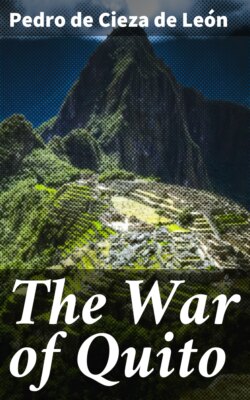Читать книгу The War of Quito - Pedro de Cieza de León - Страница 24
На сайте Литреса книга снята с продажи.
CHAPTER XVIII
ОглавлениеTable of Contents
How Gonzalo Pizarro sent Mezcua as a spy to Lima, and how, not finding the equipment he expected in the city, he did not wish to leave it.
When the Captain Gonzalo Pizarro was established in the houses at Cuzco, some of the citizens came to visit him, but they were not all disposed to follow him in his policy of resistance. In order to gain them over, he said that he would dispose all his forces for the public good, as for his own brothers and companions; without saying a word that would give them any suspicions of his evil intentions and tyrannical thoughts, which were to seize the kingdom. The citizens had received news that the Viceroy was coming from Truxillo to Lima (where he had been acknowledged, as well as in all the other cities and towns of the kingdom), in order to see that no harm arose in the future from the proceeding of Gonzalo Pizarro. Those in Cuzco who believed this, agreed not only to show him no favour, but seldom to visit him. He, seeing how cold those had become who had invited him to come, became sad, saying that he wished to return to Charcas. He sent for one of his servants named Mezcua, and told him to go to Lima with all speed, to find out what was happening there, and whether the Viceroy would soon enter the city. Mezcua set out, and Gonzalo Pizarro waited for the result, and to see whether the citizens of Cuzco would then receive him as their defender and Procurator-General.
At this time there arrived in Cuzco the Licentiate Benito Suarez de Carbajal, with a bad report of the Viceroy’s conduct and of the rigour with which he was enforcing the new laws. Gonzalo Pizarro rejoiced at his arrival. The Licentiate de la Gama travelled along the route of Cuzco, very glad that he had been able to get away from Lima before the arrival of the Viceroy, but enraged at that official’s proceedings, telling every one he met that they should return to Cuzco and not go on to Lima, because the cruelty of the Viceroy was great. The Licentiate Leon, being apprised that the Viceroy was near Lima, left that city by the coast road to Arequipa. He left a letter to the Viceroy saying that he did not go to create any disturbance, nor against the service of the King our Lord nor of his lordship; but merely to his own property. He concluded with the assurance that he would never join any one who was not a servant of the King. But he only kept this promise for the time it took him to write the letter. As soon as he arrived at Cuzco he expressed joy at Gonzalo Pizarro’s position in the city. He not only joined him, but declared that it was lawful for him to petition against the new laws, even in arms, with the title of Procurator-General, if the Viceroy should insist on doing harm. The opinions of the lawyer and others who did not fail to endorse what he said, induced many people to join Pizarro, which did not cost them more than their lives and estates, and being branded as traitors.
One thing I wish to affirm, that the citizens of Cuzco, as well as those of Lima, merely desired nor had they any other wish than that his Majesty the King our Lord should suspend the new laws because much evil would arise from their enforcement. When they chose Pizarro as Procurator, they nominated three or four conquerors to accompany him with his petition but these, being sheep, had chosen a wolf for their guard.
Those who have made kings out of tyrants have always done harm to republics. Those of the isle of Cadiz who, in war with the Andaluces, were constrained to send to Carthage for help, remained with all their republics as vassals to their supposed friends. Ceasing to speak of very ancient times in which there were many such examples as well among the tyrants of Sicily as in Greece, all the cities of Italy were free and exempt, but now are held by Lords and have lost their liberty, by what means those who are curious well know and can clearly see. In the name of liberty Pompey fought. Cæsar did the same, and Octavius and Mark Antony. These remained Lords, and of those who opposed them, some were killed and the others became vassals. As the Carthaginians did not give Asdrubal and his brother-in-law Hannibal rule and power over their city, their affairs went forward.
The citizens of Cuzco and Lima desired that their Procurator should be Pizarro, who was to venture his life and honour for their liberties. It was not remembered that he was the brother of Hernando Pizarro, the other raiser of former wars, and that it was publicly known that, after he came from Canela, many had heard him say that the King our Lord had treated him badly in not having made him governor of the province after the death of the Marquis, and, on many other occasions, that he would govern though it was against all the world. From the time that Gonzalo Pizarro knew that the Viceroy had arrived, and that he had received letters urging him to undertake the enterprise, he had resolved to be Governor, though he carefully dissimulated, saying that he only sought the public good and his own rest, and that he only wished for the means to live.
